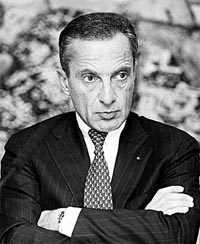There couldn't be any better news for Veolia Environment than the 17th Party Congress setting conservation and environmental protection as one of the key issues for the country's development.
Against the backdrop of such a positive government policy, the world's leading environmental service provider aims to grow its China business by an average 30 percent annually, said Henri Proglio, chairman of the board of directors and CEO of the company, during his recent trip to Beijing.
"It means more opportunities for all four divisions of Veolia - water, waste, energy and transportation," said the CEO of the France-headquartered firm.
He said Veolia will continue to invest heavily in China. By 2013, its total investment in the country is expected to amount to $2.5 billion, compared with the current $1.5 billion.
Since entering China a decade ago, Veolia, which ranks 128th among the top 500 global companies, has emerged as one of the largest investors and operators in water and waste business in China, with more than 60 projects across the country.
Its China business reached $1 billion last year, with a local staff strength of 15,000.
Proglio, who comes to China a couple of times a year to meet representatives of the local government, partners and staff members, said one of the challenges for establishing a conservation culture in China is the urban heating system. Many cities still use decades-old equipment and pipes, which need to increase energy efficiency and reduce emissions.
"Our energy division, which has the leading technology and equipment in this area, has huge potential here," Proglio said.
In June, the energy division won its first urban heating contract in the country, which is the flagship project in one of the coldest cities of China - Jiamusi, in Heilongjiang Province.
The system serves 250,000 residents as well as businesses and municipal buildings, covering 5.5 million square meters
Veolia plans to increase it to nearly 15 million sq m of building space by 2020. As part of the contract, more than 600 employees will join Veolia's teams.
After meeting officials from the Jiamusi municipal government, Proglio was amazed by their determination to modernize the city from the old industrial base. "Jiamusi's case is exactly like northeastern France that underwent renovation several years ago. We have gained lots of experience in France, which can be applied in many cities here," he said.
Veolia recently won an urban heating contract in Harbin, capital of Heilongjiang Province, to build and operate more than 17 million sq m of building space in the southwestern part of the city.
In Chongqing, the company is in talks with the public transportation department on managing 1,000 buses and 3,500 public transportation staff, Proglio said, but declined to reveal when the deal is expected to be sealed.
"With our first transportation project in China, the transportation division, which is the leader in Europe, will quickly expand to other cities."
A few weeks ago, Veolia signed a 30-year contract with Tianjin Municipality to supply 3 million people with drinking water.
The contract will cover the northern part of Tianjin, and the Binhai New Area on the eastern coast, including managing the Xinkaihe water production plant, which processes 1 million cu m a day and 1,988 km of linear network, as well as acquiring Jinbin water production plant, which will provide 500,000 cu m of water a day in the first phase.
"It's a joint venture project with Tianjin Municipality. We have invested equipment and technology worth $200 million in it," Proglio said.
As for the waste division, it has signed a 30-year waste disposal contract with Jiujiang, in Jiangxi Province, to design, build and operate sanitary waste landfill sites with a total capacity of 16 million tons.
Veolia Environment Group, established in 1853, is a leading global environmental service and solution provider in water resources, waste, public transport and energy. It has 300,000 employees in more than 80 countries, and its revenue hit $45 billion last year.
The firm aims to keep the annual growth rate at 10 percent worldwide, and double the revenue in seven to eight years.
(China Daily November 15, 2007)






